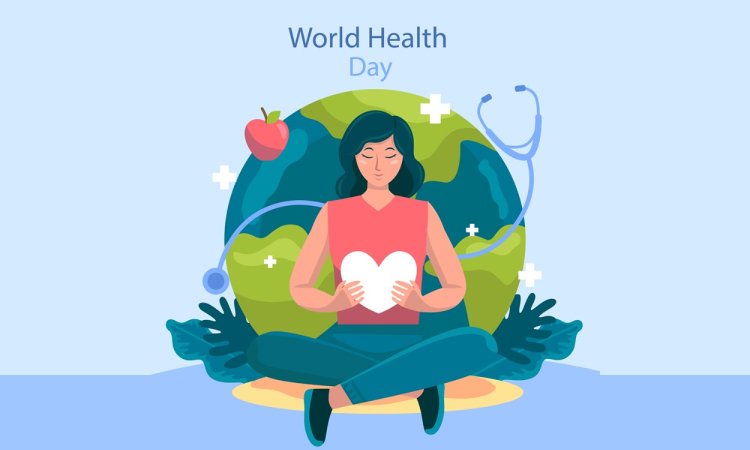World Health Day 2024: Is India Doing Enough To Provide Quality Healthcare To One And All?
World Health Day 2024: Is India Doing Enough To Provide Quality Healthcare To One And All?

Every year on April 7th, we celebrate World Health Day, focusing on a specific theme related to global health. In 2024, the theme is "My Health, My Right." This makes us ponder where India stands to provide quality healthcare.
According to the WHO Council on the Economics of Health for All, the Constitutions of 140 countries recognise the Right to Health as a basic human right. And India is one of them. Yet, we hear and read about numerous health crises daily.
The important question here is - Is India doing enough? We will discuss how the Indian healthcare system contributes to enacting this right of people. And how other resources like health insurance are making healthcare more accessible.
Health Report of The Country
India's healthcare sector has witnessed dynamic changes in the past decade. During the COVID-19 pandemic, the nation mobilised resources to develop a vaccine in a matter of months. India also set up small units to make information, testing, and vaccinations available to every part of the country.
The Indian government has introduced schemes such as the Ayushman Bharat Pradhan Mantri Jan Arogya Yojana (PMJAY). Under this, millions of economically vulnerable citizens get subsidised health insurance.
The National Health Mission (NHM) continues to play a crucial role in improving maternal and child health outcomes. Other initiatives, like the National Digital Health Mission (NDHM), aim to leverage technology for efficient healthcare delivery in India.
However, the shortage of doctors and hospital beds, affordability, and quality still need to be solved. Out-of-pocket expenses remain a burden for many. Health insurance still needs to be seen as the perfect solution it is.
India has yet to overcome these hurdles to make healthcare accessible to everyone.
Diseases Are Still Prevalent In India And Need Attention
India has a large population and needs more habitual spaces where people can live comfortably. There are slums and communal toilets in many areas of the country. These spaces lack the quality of hygiene needed to prevent the spread of diseases. That is why India is prone to infectious diseases like tuberculosis, malaria, and dengue.
There’s also a significant increase in the number of non-communicable diseases like diabetes, cardiovascular ailments, respiratory disorders, and cancer. Additionally, mental health issues are emerging as an important public health concern. Ever since the death of a famous movie star due to mental health issues, Indians have taken responsibility for getting treatment for mental illnesses.
Addressing these ailments requires a multi-pronged approach focusing on prevention, early detection, and treatment. This can be achieved by improved sanitation, preventive healthcare measures, better access to diagnostic and treatment facilities, and proper health insurance coverage.
What can we do to ensure access to better healthcare for one and all?
There’s a lot of scope to strengthen India's healthcare system. Both government and private sectors can collaborate to provide better healthcare for one and all. Here are some ideas to consider:
Strengthen Healthcare Infrastructure
Investing in healthcare infrastructure, including hospitals, clinics, and primary healthcare centres. This is particularly needed in underserved regions and rural regions.
Promote Preventive Healthcare
Emphasising preventive measures such as vaccination drives, health education, and the need for health insurance. Promoting healthy lifestyles can reduce the occurrence of diseases and thus cause less burden on healthcare systems.
Enhance Healthcare Affordability
Implementing measures to make healthcare more affordable. This can include subsidising essential medicines, expanding health insurance coverage, and regulating healthcare costs. This can remove the financial constraints and make treatment accessible to needy people.
Improve Healthcare Quality
Enhancing the quality of healthcare services through training healthcare professionals, implementing quality standards, and leveraging technology. It can improve patient outcomes and decrease the need for repetitive visits.
Conclusion
As we observe World Health Day, assessing India's progress is important. India is on the right track towards achieving the right to healthcare for all. However, there are still significant gaps in the healthcare system. By addressing each issue individually, India can build an accessible healthcare system.
Disclaimer: The above information is for illustrative purposes only. For more details, please refer to the policy wordings and prospectus before concluding the sales.
RELATED ARTICLES
What is the difference between the Ayushman Bharat Card and the Health ID card?
What is Healthcare Professionals Registry? Why is it important?
Various Options Available for Health Insurance
Common Inclusions of Health Insurance
Is It Worth Buying A 1 Crore Sum Insured Healthcare Plan?










 Health Insurance
Health Insurance  Travel Insurance
Travel Insurance  Car Insurance
Car Insurance  Cyber Insurance
Cyber Insurance  Critical Illness Insurance
Critical Illness Insurance
 Pet Insurance
Pet Insurance
 Bike/Two Wheeler Insurance
Bike/Two Wheeler Insurance  Home Insurance
Home Insurance  Third Party Vehicle Ins.
Third Party Vehicle Ins.  Tractor Insurance
Tractor Insurance  Goods Carrying Vehicle Ins.
Goods Carrying Vehicle Ins.  Passenger Carrying Vehicle Ins.
Passenger Carrying Vehicle Ins.  Compulsory Personal Accident Insurance
Compulsory Personal Accident Insurance  Travel Insurance
Travel Insurance  Rural
Rural 











